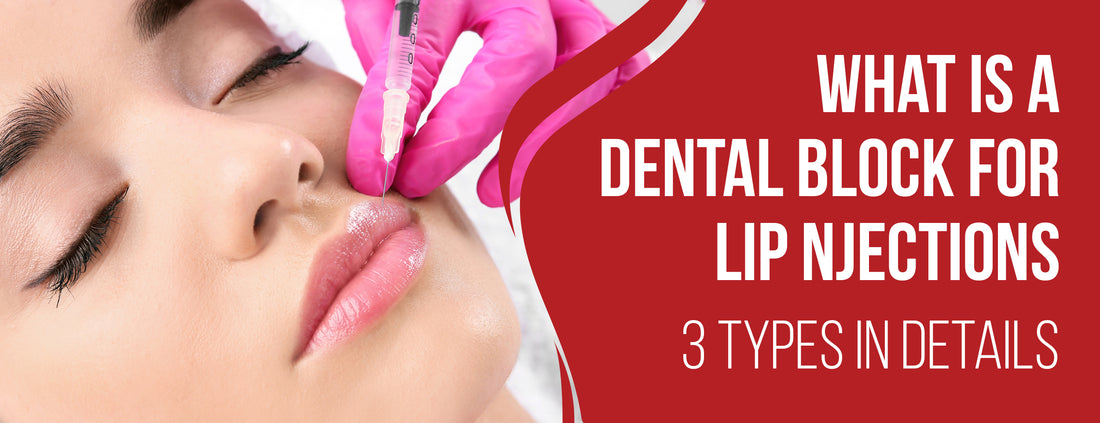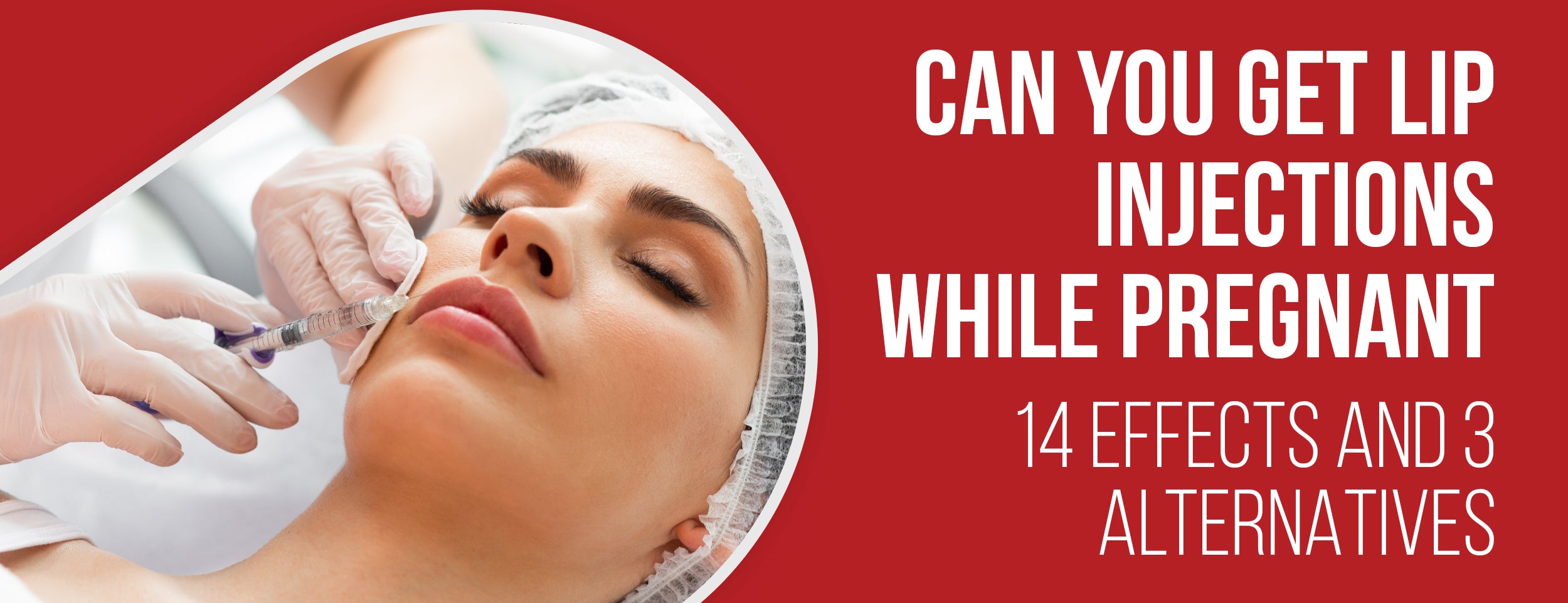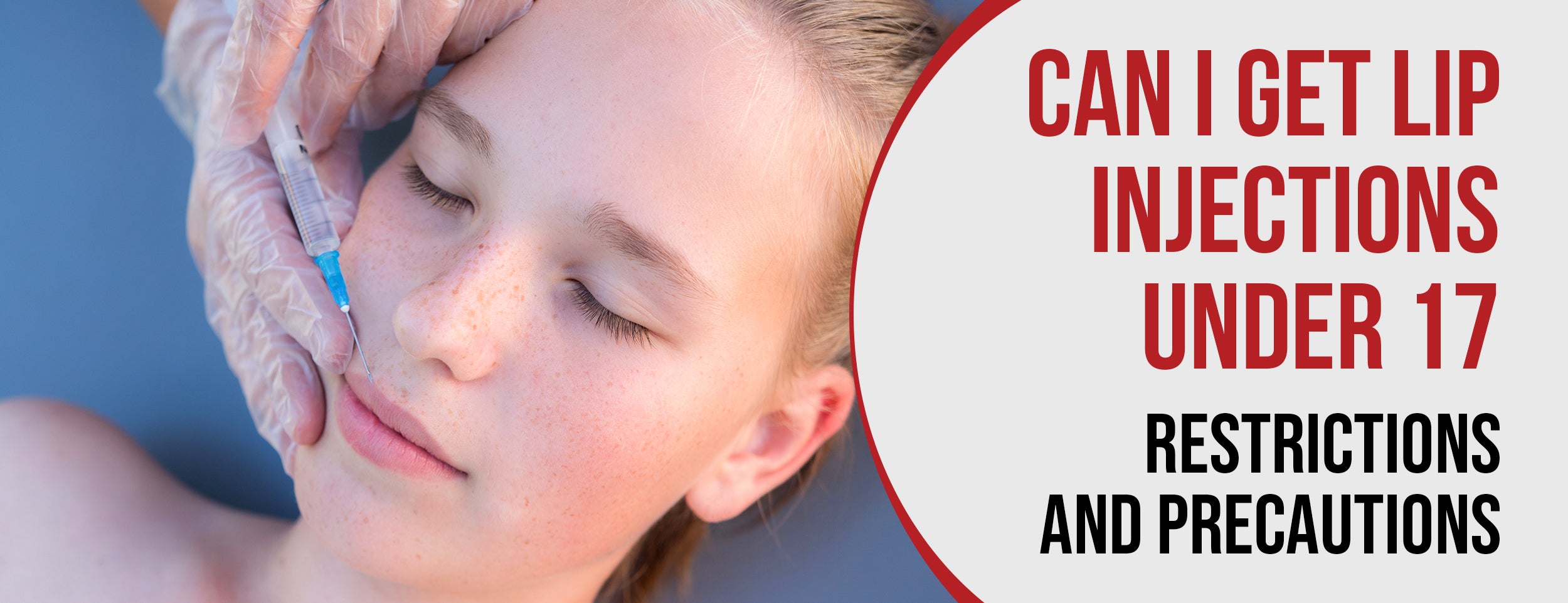A dental block is a numbing anesthesia used for painless and precise lip injections. It minimizes bruising and swelling, ensuring a more efficient procedure.
An infraorbital or dental block involves injecting an anesthetic agent, such as lidocaine, into the nerve. The infraorbital nerve supplies sensation to the lower eyelids, sides of the nose, and upper lips.
In this blog post, we will discuss the different dental blocks available for lip injections, how they affect the procedure, and the risks and precautions.
What Is A Dental Block For Lip Injections: 3 Types

A dental block aims to numb the nerves in the mouth during the lip injection procedure and prevent any discomfort or pain. Infiltration, nerve block, and field block anesthesia are 3 types of dental blocks that can be used for lip injections.
Infiltration Anesthesia
As the most straightforward and safest dental block for lip injections, infiltration anesthesia is most commonly used. In this type of anesthesia, a small amount of anesthetic solution is injected directly into the site.
After diffusing throughout the tissues, the fundamental blocks pain signals and numbs nerves. Small areas, such as the corners of the mouth, are typically anesthetized with infiltration anesthesia, but larger areas can also be anesthetized if necessary.
Nerve Block Anesthesia
It's a more specialized dental anesthesia for larger mouth areas. Anesthetic solutions are injected near sensory nerves near the site to be injected with this type of anesthesia.
This eliminates all feeling in the area, not just where the injection will be administered. When injecting the entire upper or lower lip, nerve block anesthesia is typically used.
Field Block Anesthesia
Field block anesthesia is another dental block used for larger mouth areas. It involves injecting an anesthetic solution around the entire area to be anesthetized.
The anesthetic answer is more difficult to administer and blocks all sensations in the area. Anesthesia using a field block is typically used for larger lip injections,such as those involving the entire upper and lower lip.

Lip Injections With Dental Blocks: 4 Positive Effects
It is a relatively simple procedure, but it can still be uncomfortable for some patients. This dental block minimizes discomfort for lip injections and maximizes effectiveness.
Precision and Accuracy
Using a dental block during lip injections increases precision and accuracy. The patient is less likely to move or make sudden movements if the area around the lips is numb, which could lead to the injector injecting the filler in the wrong place inadvertently. It gives the injector peace of mind and ensures that the procedure produces the desired results.
- Dental blocks allow injectors to adjust to achieve symmetrical and natural-looking lips.
- Precision and accuracy during lip injections lower the risk of complications such as lumps and bumps.
Minimized Risk of Bruising and Swelling
The procedure minimizes swelling and bruising. Dental blocks reduce blood flow to an area, which limits the amount of trauma during injections. Patients will probably experience less discomfort and swelling following the procedure.
- Blocks reduce blood flow to the area, limiting the amount of trauma during the injection process.
- Minimizing the risk of bruising and swelling can speed up recovery and reduce overall downtime.
Efficiencies and Speed
Dental blocks can speed up lip injections. By numbing the area, the injector can work more quickly and precisely. The procedure can also be sped up because there is less risk of bleeding or bruising.
- Dental blocks can reduce the number of injections required to achieve desired results, reducing recovery time.
- Faster and more efficient procedure lowers the risk of infection or complications caused by extended downtime.
No Need for Multiple Injections
With a dental block, you don't need to get various injections before the procedure. This is because the numbing agent is injected into the nerves of the mouth instead of directly into the lips.
Lip Injections With Dental Blocks: 6 Risks

Lip injections with dental blocks offer a popular solution for enhancing lips, but it's important to be aware of the risks involved. While considered safe, there are several potential side effects to consider. From temporary numbness and tingling to the rare possibility of allergic reactions, understanding these risks is crucial before undergoing the procedure.
Lip Numbness and Tingling
One of the most common side effects of dental block for lip injections is temporary numbness and tingling of the lips and surrounding areas. This numbness can last several hours, and in rare cases, it may persist for a few days.
Anesthesia Allergic Reactions
Another risk of dental block is the potential for an allergic reaction to the anesthesia. This is a rare occurrence. It can be life-threatening in severe cases. Your healthcare provider should be informed if you have any known allergies before undergoing a dental block. Incomplete Numbing: A dental block may not thoroughly numb the desired area.
Nerve Damage
Dental local anesthetic injections can cause nerve damage. This risk arises from needle placement, toxic anesthetic medications, and hematomas.
Hematoma
Hematoma is an unpleasant bruise when an injury accumulates blood beneath the skin, resulting in a spongy and lumpy texture. Fortunately, hematoma is typically not a cause for alarm. It is important to note that a hematoma differs from a blood clot in a vein and does not contribute to the formation of blood clots.
Increased Injections
The number of overall injections and skin entry points will increase, resulting in post-procedural pain and bruising.

Post-Procedure Discomfort
Patients may experience discomfort after the procedure because of the persistence of the numbing sensation. This can temporarily affect symmetry, making the lip augmentation process more challenging, especially when trying to accomplish your lip's ideal balance and symmetry.
Dental Block For Lip Injections: 5 Precautions
A dental block is used to numb the treated area during lip filler procedures. It involves administering a local anesthetic near the nerves that supply sensation to the lips, effectively blocking the transmission of pain signals. Here are some precautions and considerations associated with lip injections with dental blocks:
Sterile Field
It’s crucial to create a sterile field by cleansing the treatment area, wearing sterile gloves, placing sterile drapes, and maintaining an aseptic technique throughout the procedure. Infection risks are minimized, and patient safety is ensured.
Anesthetic Options
Nowadays, almost all companies in the United States have mixed their hyaluronic acid with lidocaine, which is a much better way to do things. Instead of an entire dental block, a topical anesthetic is applied, and a little filler is injected into the lip through the anesthetized area. This makes the procedure less uncomfortable as it progresses.
Post-Procedure Care
You should not have any pain after the process because you’ll have a bit of local anesthesia. It won’t last so long to impede eating, but it will keep you anesthetized during and for a little afterward. You can apply ice and maybe take a Tylenol.
Patient Comfort
Using a dental block contributes to increased patient satisfaction1. With the targeted area effectively numbed, patients can undergo the procedure without discomfort or pain. This allows medical professionals to perform their work precisely and accurately, producing superior results.
Patient Anxiety
Occasionally, a patient might be anxious and request a dental block. In such cases, a dental block can be administered if the practitioner knows how.

Conclusion
Dental blocks are a safe and efficient way to reduce pain and discomfort during lip injections. It allows for more precise injections, reduces the need for multiple injections, and increases patient comfort and satisfaction.
Patients must know potential risks and side effects and take necessary precautions before getting a dental block. If you experience any of these side effects, contact your doctor immediately. Dental block is an excellent option for those seeking to enhance their lips' appearance with minimal pain and discomfort.










![The 7 Factors That Determine Whether You Can Get Lip Injections With Breastmilk [7 Safety Tips]](http://drnumb.com/cdn/shop/articles/Can_You_Get_Lip_Injections_While_Breastfeeding__6_Factors_7_Safety_Tips.jpg?v=1711186573)



